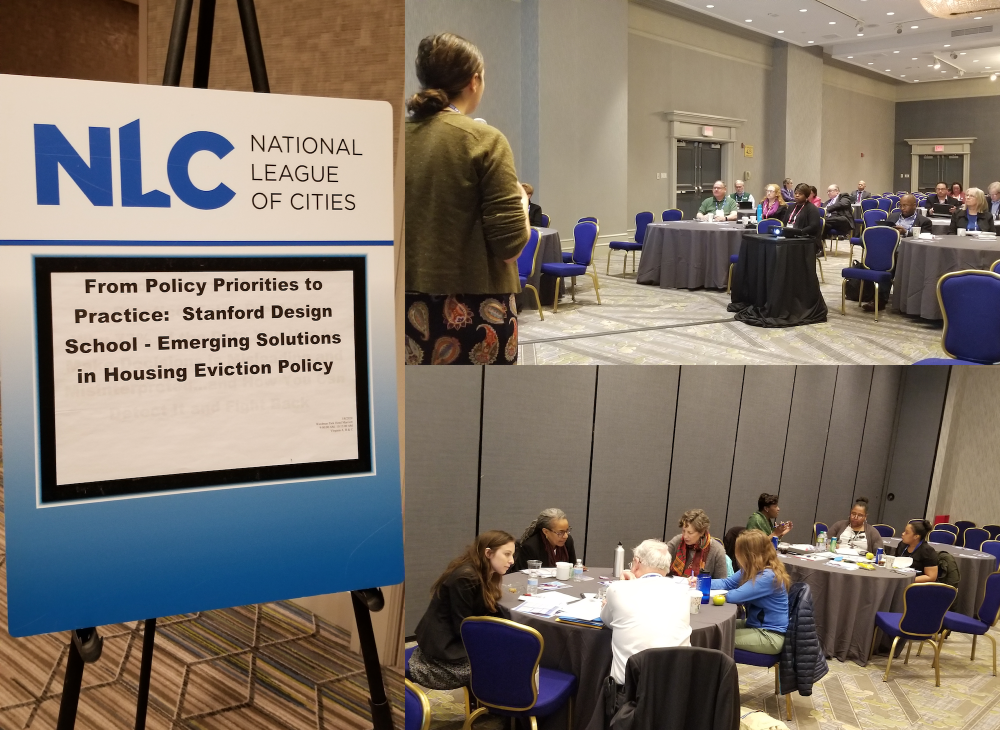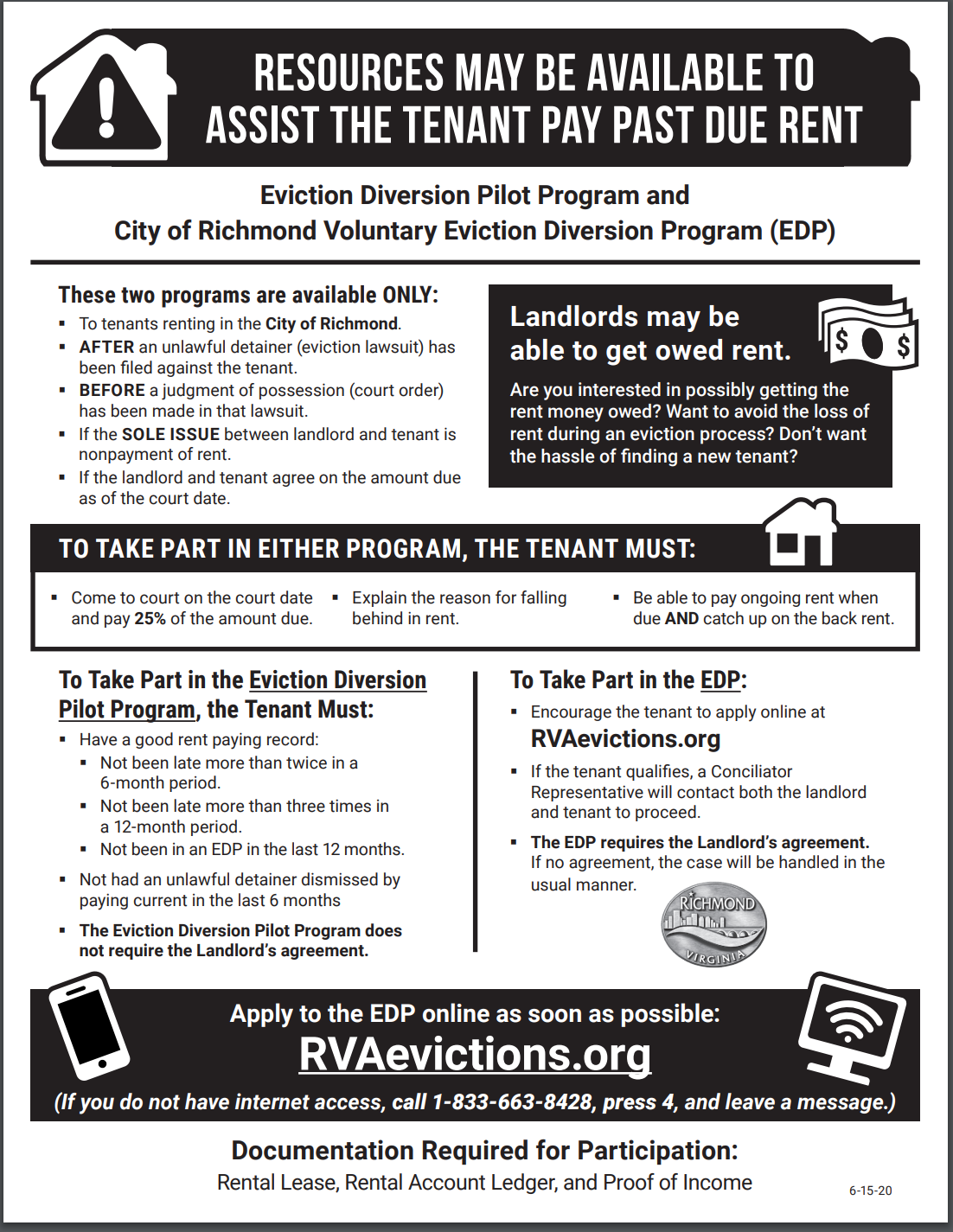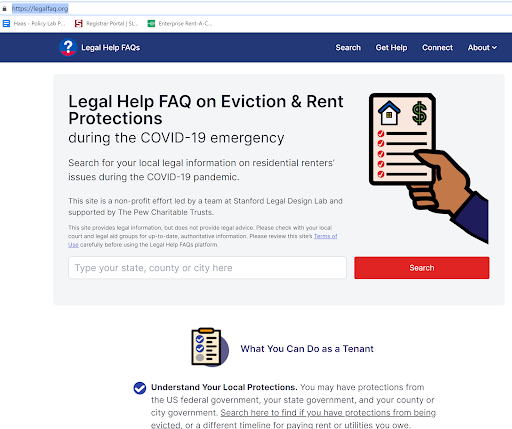
Avoiding the COVID-19 Eviction Cliff
Written by Celia Malone, Policy Lab Communications Intern
The new coronavirus has significantly changed how we live day to day, making formerly quotidian tasks challenging – buying a morning coffee, picking up a loaf of bread, even interacting with our neighbors. Those tasks escalate exponentially for those who have lost their incomes in the wake of economic fallout. Long before COVID-19, our major cities were experiencing a crisis in access to affordable housing. With a coronavirus-induced recession now upon us, socioeconomic inequality is more profound than ever before. If you have been laid off from your living in the retail, leisure, or hospitality industries; if you have had to stop working because schools were closed and your children were home; or if you have no health insurance and experience health costs, you may now be wondering how you will pay next month’s rent or whether to pay medical costs or the mortgage. With the downturn in the economy and rising numbers of under- or uninsured people struggling to pay for medical care, our nation faces a new threat: an imminent tidal wave of evictions.
Across the U.S., many thousands of people are struggling to pay rent and may lose their homes this summer because of the impact of COVID-19 on the economy. Cities, counties, and states have issued moratoriums on evictions and some have set aside millions to help tenants avoid eviction. Congress has also banned evictions until July 25 on federally managed rentals and mortgages. These programs and policies buy time for policy makers to develop remedies to tamp down evictions and allow people who have lost their incomes to stay in their homes. But time is running out. With moratoriums expiring this month and courts beginning to reopen, the backlog of eviction cases filed before the COVID-19 shutdown will be exponentially compounded by the imminent explosion of new cases.
In the Bay Area, San Francisco issued a temporary moratorium on evictions, sheriffs in most California counties are not currently enforcing evictions, and eviction actions moving through the courts have all but frozen. The challenge takes place in a market already profoundly affected by a lack of affordable housing with rents escalating faster than salaries keep pace. Other cities across the country may not face the same lack of affordable housing but, as residents lose their jobs or see their incomes decline, rent that was affordable two months ago may now be out of reach. In Arizona, for example, landlords may file as many as 5,000 more eviction cases in coming weeks compared to the same period in 2019. Solutions to the housing crisis that once seemed on the horizon are receding fast with the crisis demanding more innovation than cities, counties, and state governments are prepared to deliver.
The National League of Cities (NLC) has responded nationally with a call for all hands on deck.

Now, in partnership with the NLC, the Stanford Legal Design Lab and the Law and Policy Lab have teamed up to join the fight to help people stay in their homes. Through the Justice By Design + Eviction lab, this partnership leverages several years of research innovating new solutions to prevent and mitigate eviction. Before the COVID crisis, the trajectory of the project was to develop policies and other tools that alleviate the housing crisis for lower-resourced communities. The lab developed policies that encourage localities to add more housing and technologies that make it easier for tenants to find resources for the housing they need. The lab advised the City of San Jose, for example, on policies to increase the number of accessory dwelling units (converted garages) and online tools to help low-resourced communities access legal information for tenant rights.
Now, with COVID-19, the urgency for lab’s work has escalated. In the spring. a cohort of agencies in five cities approached the NLC and the Legal Design Lab for immediate help in combating eviction. Representatives from the cities of Richmond and Norfolk, Virginia; Philadelphia and Pittsburgh, Pennsylvania; and Grand Rapids, Michigan, now join in regular online peer meetings and training webinars to share their practices in implementing eviction prevention and diversion programs quickly and effectively. The Legal Design Lab is collecting information from their experiences to share nationally with other cities seeking to help their own communities avoid eviction.
It became clear that “what was bad before was only going to get worse” explained Margaret Hagan, the director of the Legal Design Lab and the Justice by Design + Eviction project. “Everything we planned for before could no longer be applied.”
Prior to COVID-19, Hagan’s eviction research had surfaced practices and policies in Oakland, Los Angeles, and New York, where robust policies could manage evictions. Even in cities with strong policies, many tenants were confused about their rights and the protections available to them. That information offered learning for a second research team that then drafted and profiled possible programs for other cities seeking to mitigate COVID-19-related evictions.

The research teams then built two websites – one for government decision makers and researchers and the other for tenants seeking to understand their rights and the resources available to them. The Legal Design Lab Eviction Innovations website presents case studies and extensive research to help government decision makers develop effective solutions. The second website, Legal Help FAQs, helps tenants quickly find eviction-related information relevant to their regions and situations. The site supplements information that tenants may gain from legal aid pro bono services and directs users to those local organizations. The information is similarly valuable to landlords who are also worrying that they may not be able to pay the mortgages on their properties. Together, the two websites reveal that legal services organizations, cities, counties, and courts across the country are making efforts to establish collaborative environments to help both landlords and tenants seeking to file emergency eviction cases.
When the Legal Help FAQs website launched officially last week, Margaret Hagan described the mission of the site in this Medium article, “Designing against legal misinformation during an emergency.” She emphasizes the wide variation in policies and practices across regions and localities nationally, with some states providing no assistance at all to residents experiencing eviction. She points out that search engines turn up information on eviction that is not relevant to the user’s locality or they may highlight resources long out of date or direct the user to sites that promote overt misinformation or costly services. The Legal Design Lab’s Legal Help FAQ site helps people access information targeted to their location and needs so that they can more easily get the help they need.
Access to information is just one part of the equation in managing evictions. In discussions with the cohort of five cities, the Legal Design Lab and NLC surfaced several priorities focused on access to funding, partnerships with court systems, and collecting demographic data. To help with their eviction prevention and diversion programs, the cities are interested in better understanding sources of funding available through the CARES Act and state and local emergency funds. Not only have these cities found that there is little public guidance available on accessing CARES Act funding, they also each face different situations in their particular regions where some local governments have released significant funding to mitigate evictions and others not. In some jurisdictions, courts are requiring that landlords and tenants attempt to mediate their disputes prior to filing claims. Other jurisdictions are bringing in additional judges to handle the heightened caseload. The cities also all describe their need for better data on the demographics most affected by evictions in the wake of COVID-19. They are frustrated in their efforts to collect data, which is widely dispersed across different agencies at different levels of government. The Legal Design Lab is now scoping a project that will help aggregate data across these agencies to help cities navigate the eviction crisis.
Eviction Diversion Flyer – Richmond VA 2020

The implications of the economic fallout of COVID-19 are dire for many communities. For people facing eviction, the Legal Help FAQs site can help people locate information about policies in effect in that person’s specific community and the resources available there to help people stay in their homes. As you can see from the RVAevictions.org flyer circulating now in the NLC cohort-city of Richmond, there may be resources for both landlords seeking back rent and tenants unable to pay. These eviction diversion programs are proliferating across the country and the Legal Help FAQs site can help people find them expeditiously. Even with such information at hand, tenants may face slow processing times or have difficulty producing the evidence demonstrating that they meet the terms of the programs. The programs are not well-aligned with CARES Act criteria and may have different funding streams for different types of tenants and property owners. In some instances, these barriers add up to millions of dollars that may go unused.
In coming months, the five-city NLC cohort will present their findings and experiences and share lessons publicly so that other cities may improve their own eviction prevention and diversion programs, gain access to funding, and improve their own data collection. These new programs, funding streams, and information sources may help mitigate more than the economic impact of the pandemic. They may provide avenues that help cities and counties develop long term practices that foster equity across the system. Stay tuned to the Policy Lab blog, the NLC website, and follow Margaret Hagan on Medium to watch this transformation in real time.

Leave a Comment